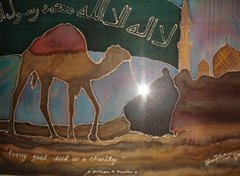
ft-20
Saint Worship-2
TAQWAA
A living faith drives the one who possesses it to shield himself from whatever displeases Allah. This shield in Arabic is called “Taqwaa.” It has been variously translated as “fear of God”, “piety”, as well as “God-consciousness”; and it carries all these meanings and more.
Allah clearly expressed the superiority of Taqwaa as follows:
Surah 49 Al-Hujaraat (The Inner Apartments)
13. O mankind! We have created you from a male and a female, and made you into nations and tribes, that you may know one another. Verily, the most honourable of you with Allah is that (believer) who has At-Taqwa [i.e. one of the Muttaqun (pious - see V.2:2). Verily, Allah is All-Knowing, All-Aware.
The Messenger of Allah (saw) said, “A woman is married for four (reasons): her wealth, her nobility, her beauty and her piety. Choose the pious one and be successful.” (Al-Bukharee vol.7 p.18-19 no.27 and Muslim vol.2 p.249 no.3457)
No matter how beautiful, rich or well-bred a woman might be, if she is not pious, she is inferior to a pious, ugly, poor woman from a dishonorable family.
A living faith drives the one who possesses it to shield himself from whatever displeases Allah. This shield in Arabic is called “Taqwaa.” It has been variously translated as “fear of God”, “piety”, as well as “God-consciousness”; and it carries all these meanings and more.
Allah clearly expressed the superiority of Taqwaa as follows:
Surah 49 Al-Hujaraat (The Inner Apartments)
13. O mankind! We have created you from a male and a female, and made you into nations and tribes, that you may know one another. Verily, the most honourable of you with Allah is that (believer) who has At-Taqwa [i.e. one of the Muttaqun (pious - see V.2:2). Verily, Allah is All-Knowing, All-Aware.
The Messenger of Allah (saw) said, “A woman is married for four (reasons): her wealth, her nobility, her beauty and her piety. Choose the pious one and be successful.” (Al-Bukharee vol.7 p.18-19 no.27 and Muslim vol.2 p.249 no.3457)
No matter how beautiful, rich or well-bred a woman might be, if she is not pious, she is inferior to a pious, ugly, poor woman from a dishonorable family.
The converse is also true, as the Prophet (saw) said, “If a man who practices the religion satisfies you, asks for your daughter
in marriage, you should marry them; otherwise there will be corruption in the land.” (Abu Hurayrah and collected by Tirmidhi)
The Prophet (saw) once reprimanded Abu Dharr for derisively calling Bilal, ‘son of a black woman’, then he went on to say, “Look! Surely you are not better than a brown man nor a black man except by fearing Allah more than them.” (Abdullah ibn Amr and collected by Ahmed)
The most pious individuals are only known to Allah (swt). Allah made that abundantly clear in the following verse:
Surah 2Al-Baqarah (The Cow)
204. And of mankind there is he whose speech may please you (O Muhammad (saw)), in this worldly life, and he calls Allah to witness as to that which is in his heart, yet he is the most quarrelsome of the opponents.
Therefore, it is not permissible for humans to designate certain people as being particularly saintly and pious to a degree beyond the reach of ordinary humans.
The Prophet (saw) once reprimanded Abu Dharr for derisively calling Bilal, ‘son of a black woman’, then he went on to say, “Look! Surely you are not better than a brown man nor a black man except by fearing Allah more than them.” (Abdullah ibn Amr and collected by Ahmed)
The most pious individuals are only known to Allah (swt). Allah made that abundantly clear in the following verse:
Surah 2Al-Baqarah (The Cow)
204. And of mankind there is he whose speech may please you (O Muhammad (saw)), in this worldly life, and he calls Allah to witness as to that which is in his heart, yet he is the most quarrelsome of the opponents.
Therefore, it is not permissible for humans to designate certain people as being particularly saintly and pious to a degree beyond the reach of ordinary humans.
When the Prophet (saw) said concerning those who make a pledge of allegiance known as Bay’ah ar-Ridwaan, “No one who made a pledge beneath the tree will enter the hellfire,” (Muslim vol.3 p.1034 no.4576) he was confirming the Qur’anic verse revealed to that effect
Surah 48 Al-Fath (Victory)
18. Indeed, Allah was pleased with the believers when they gave their Bai'a (pledge) to you (O Muhammad (saw)) under the tree, He knew what was in their hearts, and He sent down As-Sakinah (calmness and tranquillity) upon them, and He rewarded them with a near victory,
Similarly, he (saw) judged some whom everyone thought were destined to Paradise to be among those destined for Hellfire. All such judgments are based on revelation.
Ibn ‘Abbaas said that he was told by ‘Umar ibn al-Khattaab that on the day (of the battle) of Khaybar, some of the Prophet’s companions came and said, “So and so is a martyr and so and so is a martyr,” but when they came to a man about whom they said, “So and so is a martyr,” Allah’s Messenger declared, “By no means! I have seen him in hell in a cloak which he took (from the spoils) dishonestly.” Allah’s Messenger then said, “Go, Ibn al-Khattaab, and announce among the people three times that only the believers will enter paradise.” (Muslim vol.1 p.65 no.209)
Hadith on the Prophet (saw) hearing Bilal’s footsteps in Paradise
SAINT WORSHIP IN THE CHRISTIAN TRADITION
SAINT WORSHIP IN THE JEWISH TRADITION
18. Indeed, Allah was pleased with the believers when they gave their Bai'a (pledge) to you (O Muhammad (saw)) under the tree, He knew what was in their hearts, and He sent down As-Sakinah (calmness and tranquillity) upon them, and He rewarded them with a near victory,
Similarly, he (saw) judged some whom everyone thought were destined to Paradise to be among those destined for Hellfire. All such judgments are based on revelation.
Ibn ‘Abbaas said that he was told by ‘Umar ibn al-Khattaab that on the day (of the battle) of Khaybar, some of the Prophet’s companions came and said, “So and so is a martyr and so and so is a martyr,” but when they came to a man about whom they said, “So and so is a martyr,” Allah’s Messenger declared, “By no means! I have seen him in hell in a cloak which he took (from the spoils) dishonestly.” Allah’s Messenger then said, “Go, Ibn al-Khattaab, and announce among the people three times that only the believers will enter paradise.” (Muslim vol.1 p.65 no.209)
Hadith on the Prophet (saw) hearing Bilal’s footsteps in Paradise
SAINT WORSHIP IN THE CHRISTIAN TRADITION
SAINT WORSHIP IN THE JEWISH TRADITION


